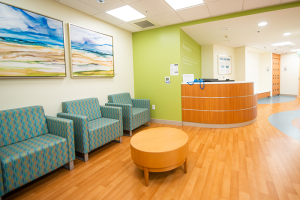Miami Children's Health System expands with new pediatric pavilion
The new Advanced Pediatric Care Pavilion at Nicklaus Children’s Hospital in Miami offers the latest medical technology and also emphasizes a homelike and playful environment for its young patients and their families.
The six-story, 213,000-square-foot tower, designed by the Miami office of Perkins+Will, represents a major milestone for Miami Children’s Health System, parent organization of Nicklaus Children’s Hospital, says Narendra Kini, CEO of the system.
“We now offer one of the most technically advanced special care spaces in the world, consistent with the excellence of our clinicians,” he says. “Equally, we have created a care setting that is supportive of families of children with critical illnesses, affording them privacy and more homelike comforts.”
A total of 189 of the hospital’s 289 beds were relocated to the new tower, including those in five units: cardiac intensive care, pediatric intensive care, neonatal intensive care, neurology-neurosurgery and the hematology-oncology unit.
Highlights of the new tower include:
- Spacious family-centered rooms that include fold-out double beds, closet space and private bath.
- Family spaces for play and relaxation that feature artwork by Florida photographers to illustrate individual floor themes: earth, water, air, sun and universe. Wall frames feature patient artwork, giving children the opportunity to leave their artistic mark on the hospital during their stay.
- Electronic touch-screen LCD panel signs located outside of patient rooms that convey isolation precautions and other care team notifications.
An opportunity to extend the family friendly environment outside the hospital existed in a space between the new facility and the existing garage.
The health system envisioned a place where patients, their families and visitors, hospital staff and nearby residents could gather in an inviting and fun environment. Innovations Design Group, Orlando, Fla., was commissioned to design what became a dynamic, creative space.
The spaces created within the front of the plaza have been used to host a variety of events from outdoor movies projected on the waterwall to the farmers markets in the lawn area.
The space also features an array of playful elements such as light and sound tubes that respond to touch. The interactive walls and floor allow children to kick a virtual soccer ball or watch virtual fish in a projected aquarium.
Bubble tubes provide a relaxing and captivating feature as the color changes, and festival lighting provides a whimsical touch as it winds throughout the space. Benches topped with colored glass glow at night.
Technology plays a major role in the new pavilion’s clinical care:
- An intraoperative magnetic resonance imaging unit (iMRI) supports care of children requiring surgery for brain tumors or medically resistant epilepsy. The iMRI is mounted on a rail system, allowing the equipment to be brought into a specialized neurosurgical suite and aids in tumor removal.
- The installation of surgical booms makes it possible to perform minor procedures within the pediatric intensive care unit. These ceiling-mounted devices feature connectivity to lights, power, oxygen and monitoring devices.
- Pneumatic tube technology speeds transport of medications and lab specimens within the hospital.
- Mobile health care apps enable staff to maintain communication.
In other health care facility news:
-
Joint venture partners Baylor Scott & White Health, a Texas health care system; Emerus, a micro-hospital developer, also in Texas; and Duke Realty, Indianapolis, commercial real estate developer, recently broke ground on a 27,149-square-foot micro-hospital near Fort Worth, Texas. It is the seventh health facility the three partners have collaborated on in Texas.
-
Houston Methodist Hospital celebrated a milestone in the construction of its new inpatient tower with a recent topping-out event at its North Tower project in the Texas Medical Center.
The 22-story, 378-bed tower will replace patient beds in Houston Methodist’s original main building and add highly advanced heart and neurosurgery operating rooms. EYP Health, formerly WHR Architects, is the lead architect and designer, and AECOM Hunt is the construction manager.
Want to see your new health care construction project featured on HFM Daily? Email project information and photos to Senior Editor Jeff Ferenc or tweet to him @JeffFerenc.




